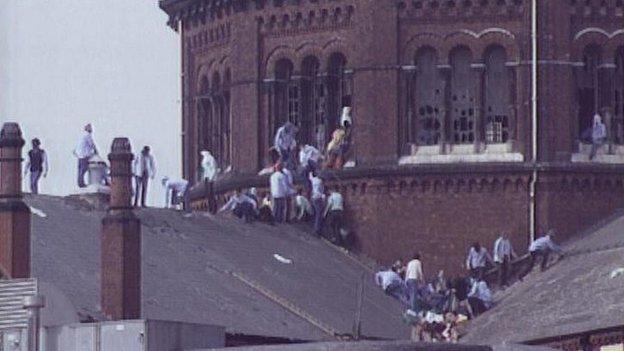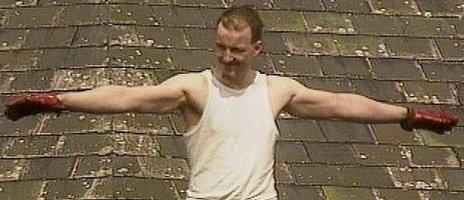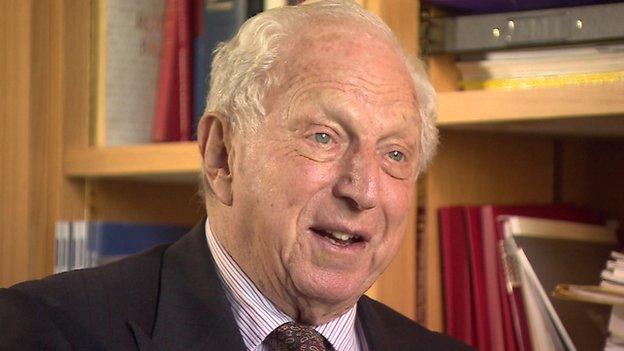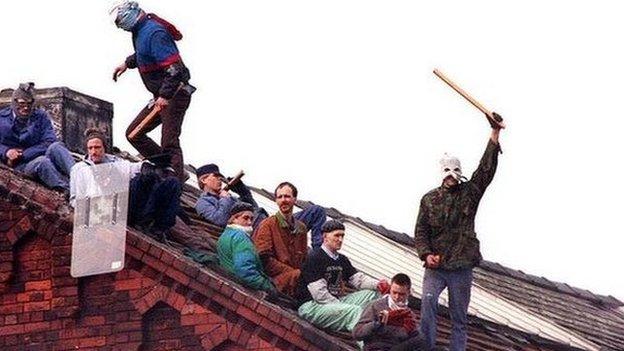Strangeways riot: Lord Woolf calls for new UK jail inquiry
- Published

Prisoners were regularly seen on the roof of the prison during the 25-day unrest
The former Lord Chief Justice who led the inquiry into Britain's biggest prison riot is calling for a new inquiry into the state of UK jails.
The Rt Hon Lord Woolf says conditions in prisons are now as bad as they were in 1990, when a dramatic siege at Strangeways went on for 25 days.
Two people died and hundreds were injured in a protest against a prison regime that included "slopping out".
Prisons Minister Andrew Selous said all UK prisons had safe population levels.
Lord Woolf said Britain was again "heading for a crisis within prisons".

Riot and aftermath

Paul Taylor was regularly seen on the roof of the prison throughout the siege
1 April 1990: Inmate Paul Taylor (pictured) grabs the microphone during a service in prison chapel to signal a sit down a protest against jail conditions
4 April: Prison Governor Brendan O'Friel describes the ensuing riot as an "explosion of evil which was quite terrible to see"
25 April: Last five inmates agree to leave the roof top protest in a hydraulic platform
25 February 1991: Lord Justice Woolf publishes his report with 12 recommendations and 204 proposals
27 May 1994: Rebuilt and renamed HMP Manchester reopens

The unrest at Strangeways started on 1 April 1990 and the ensuing siege was the longest in British penal history.
Prisoners complained the Victorian site was overcrowded, they were forced to remain in their cells for up to 23 hours a day and had to "slop out" - using only a bucket for a toilet.
Twenty-five years after the Strangeways prison riots in 1990, Lord Woolf says lessons have not been learnt and a new inquiry into prisons is needed
Lord Woolf, now chair of the Prison Reform Trust, said: "There are things that are better now than then, but I fear we've allowed ourselves to go backwards and we're back where we were at the time of Strangeways.
"For a time after the riot things were much better and numbers were going down, [but] unfortunately prisoners are again being kept in conditions that we should not tolerate, they're a long way from home and their families can't keep in touch with them.
"That's why I would welcome a thorough re-look at the situation and above all trying to take prisons out of politics".

Rt Hon Lord Woolf led the inquiry into the disturbance at Strangeways
Prisons Minister Andrew Selous said: "This government has considerably increased the adult male prison capacity from the level inherited at the end of the last Parliament.
"Yet all prisons have safe population levels and published statistics show that crowding is at its lowest levels since 2007-08.
"Staffing levels were agreed with both prison governors and the unions at the outset and prison officers have done an excellent job during a period when the prison population has unpredictably risen.
"Furthermore, we are absolutely clear that all offenders are expected to engage in purposeful activity to help them find a job on release and turn their backs on crime for good.
"The total number of hours worked in prisons has increased from 10.6 million to 14.2 million in the past four years."
Following the disturbance, Lord Woolf published a report in 1992 making more than 200 recommendations.
They included an end to "slopping out", increased contact between prisoners and their families, and better rehabilitation of offenders.
Strangeways was later rebuilt at a cost of £90m and renamed HMP Manchester.
Inside Out is broadcast on BBC One North West on Monday, 23 March at 19:30 GMT and nationwide on the iPlayer for 30 days thereafter.
- Published23 March 2015
